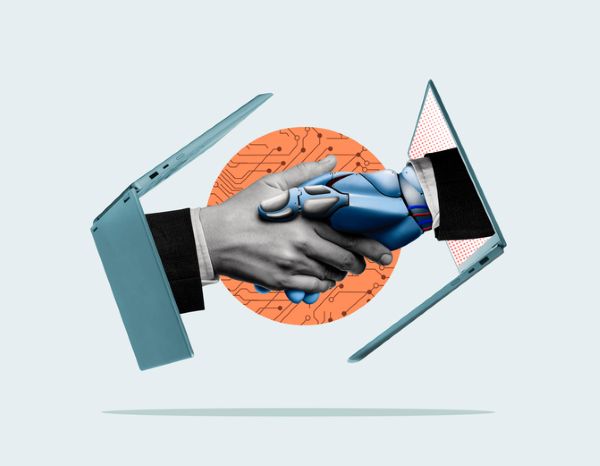There is no question that AI is disrupting the job market. It’s changing how we work and how we think about operating a business.
In speaking with our technology recruiters in Toronto, it’s clear that people are uneasy about how AI will affect the job market. They are worried that AI is taking jobs from humans.
But, is AI creating more jobs than it’s taking? This is what we’ll investigate here. Then we’ll outline the types of jobs that are being eliminated and created. We’ll finish with some recommendations from our recruiters about what workers and employers can do to adapt.
In this blog:
- What the research says about AI’s impact on jobs
- What jobs is AI taking?
- What jobs is AI creating?
- What should workers do to adapt to how AI is changing?
- What should companies do to adapt to the changing AI landscape?
What the research says about AI’s impact on jobs
There is a lot of concern about job loss as AI becomes more prominent. However, while jobs will be lost, new ones will be gained. People and companies will need to make adjustments to add new skills and capabilities to minimize the impact of AI.
Here is what research suggests about the impact of AI:
According to the World Economic Forum:
“Ninety-two million jobs are projected to be displaced by 2030, with 170 million new ones emerging. But these aren’t direct exchanges happening in the same locations with the same individuals. The real challenge isn’t only about job numbers; it’s about the gap between where jobs vanish and where they come back, between the skills workers possess and the skills that new roles require.”
“Innovation related to artificial intelligence (AI) could displace 6-7% of the US workforce if AI is widely adopted. But the impact is likely to be transitory as new job opportunities created by the technology ultimately put people to work in other capacities”, according to Goldman Sachs Research.
The McKinsey Global Institute reports that by 2030, at least 14% of employees globally could need to change their careers due to AI advancements.
What does this all mean?
AI and technological change will both eliminate and create jobs, and while the total number of new roles may ultimately exceed the number lost.
What jobs is AI taking?
AI capabilities can be applied to many industries and types of roles. Here are the top types of jobs where AI is replacing roles:
- Software development: coders, web developers
- Customer service: Call centres, tech support, customer service reps
- Finance: Accountants, bookkeepers, accounts payable/receivable
- Manufacturing and production: Assembly line, machine operators
Roles requiring more human elements and personal skills will be less impacted. Roles requiring emotional intelligence, strategic thinking, leadership, manual dexterity, originality and creativity are less impacted. This includes jobs like teachers, nurses, tradespeople, therapists, engineers, and senior leaders.
What jobs is AI creating?
AI is creating many new jobs specifically related to artificial intelligence. It’s also refining and changing many existing jobs. Here are some of the new jobs that AI is creating:
- AI Prompt Engineers: Craft effective prompts and workflows for AI systems.
- AI Ethics & Governance Specialists: Ensure AI use is ethical, compliant, and transparent.
- AI Policy & Risk Consultants: Help organizations manage regulatory and operational risk.
- Machine Learning Engineers: Build and optimize AI/ML models.
- AI Integration Specialists: Implement AI tools within existing business systems.
- Automation Workflow Designers: Build automated processes across departments.
- Conversational AI Designers: Create chatbot and voice assistant interactions.
- AI Security Analysts: Protect AI models and data from cyber threats.
- Human-AI Collaboration Specialists: Train teams to work effectively alongside AI systems.
This is just a small sample of the types of jobs that AI is creating, and many more will be created in the near future.
What should workers do to adapt to how AI is changing?
If you are concerned about being displaced, there are many things workers can focus on to reduce skill gaps and build new skills. Here are some actions our recruiters recommend you take:
- Build skills AI can’t easily replace (critical thinking, creativity, empathy, communication).
- Strengthen digital and AI literacy to understand and use emerging tools effectively.
- Continuously upgrade professional skills through courses, certifications, and training.
- Develop hybrid skill sets that combine human and technical capabilities.
- Embrace AI as a productivity partner to streamline work and improve efficiency.
- Stay flexible and open to career transitions as industries evolve.
- Explore and move toward new roles AI is creating, such as data analysis, automation support, and AI operations.
What should companies do to adapt to the changing AI landscape?
Companies across many industries are working to figure out the next steps they should take to adapt to AI. Should they go all in? Where should they focus their efforts? What doesn’t make sense to invest in?
Here is a list of actions our recruiters suggest employers look into to prepare for the changing landscape:
- Develop an AI adoption strategy aligned with business goals.
- Invest in training to build AI literacy across all levels of the organization.
- Reskill and upskill employees for future roles impacted by automation.
- Redesign jobs to combine human strengths with AI capabilities.
- Implement ethical AI guidelines to ensure responsible use of technology.
- Upgrade technology infrastructure to support AI tools and automation.
- Foster a culture of innovation and continuous learning.
A final word about the impact AI is having on jobs
AI is reshaping the workforce at an unprecedented pace, but its impact doesn’t have to be negative. As the research shows, while some roles will be displaced, many more will be created. The biggest challenge is ensuring people and organizations are prepared for the shift. The future of work with AI is about transforming jobs.
More Recruiter Insights About How AI is Impacting the Job Market
Is AI Making it Harder for New Grads to Find Work?
The Future of Work: 10 Skills That Will Be in Demand Over the Next 5 Years
Recruitment Tech Trends: How AI and Automation Are Changing Hiring





